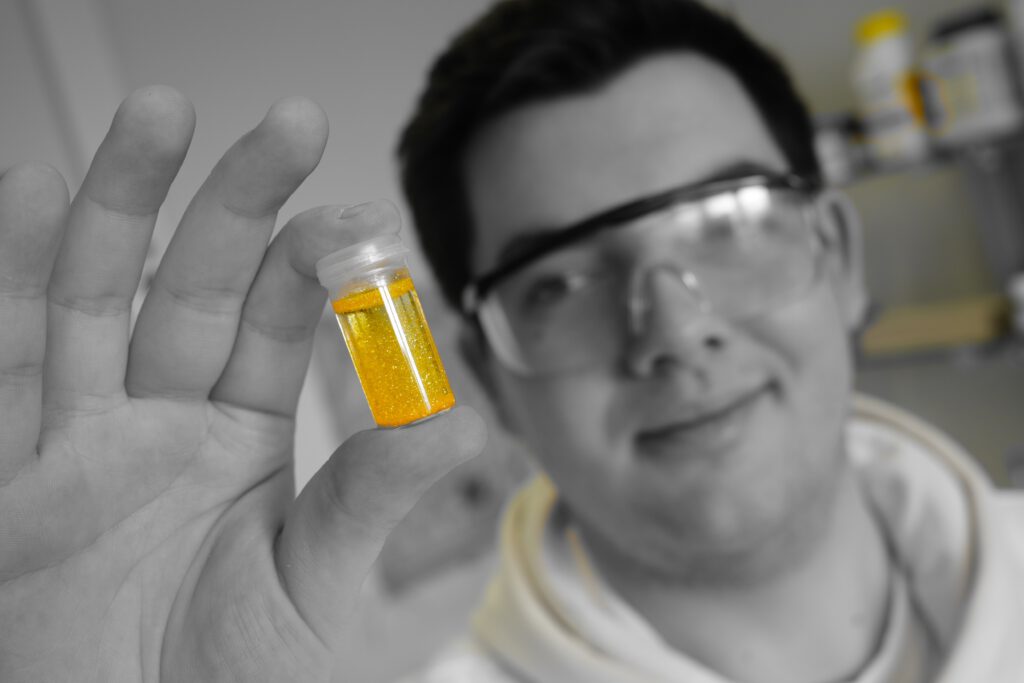Your future begins in Siegen
On the Bachelor's degree course in Chemistry, you will initially receive a basic education in the chemical subjects and related natural sciences. The course is characterized by a high proportion of experimental work in the laboratory, which is very good. There are also training courses in key professional skills such as scientific writing and presentation. With a Bachelor's degree in Chemistry, you have the best foundation for a Master's degree in Chemistry or related courses. As a rule, our students also aim for a doctorate (Dr. rer. nat.) after the Master's course.
Everything at a glance
Career prospects
A wide range of career opportunities await you: Industry, research institutes, universities, schools and the public sector offer interesting and financially attractive prospects. You can later use your chemical expertise in various fields of activity. These include research and development, laboratory management, production and environmental protection, as well as sales, marketing and management consultancy.
Students about studying chemistry

The bachelor's degree course in chemistry lays the ideal foundations for further studies in this field.
I was already interested in the natural sciences, especially chemistry, when I was at school and therefore decided to study chemistry in Siegen.
The Bachelor's degree course in Chemistry lays the ideal foundations for further studies in this field. The chemistry department has a good supervision rate compared to other universities. Direct contact with professors is usually very easy. Through the university's internal laboratory internships, you quickly and easily get to know the doctoral students in the working groups and students from higher semesters as important contacts. All in all, it's a very informal environment where you always have someone to answer your questions and provide support. I particularly like the tradition of many working groups eating together in the canteen at lunchtime.
Despite this manageable environment, you have a wide range of options when it comes to your future specialization. There are a number of compulsory elective lectures on offer, with something for everyone. The various working groups also offer a wide range of content, from theoretical calculations and modeling to basic research and research with direct application relevance.
I myself have specialized in the field of inorganic chemistry and am currently writing my Master's thesis there. I am working on the production of new types of phosphors. These are important for many different applications, such as for optimizing technology (cell phones, screens) or for medical applications as cancer cell markers or as counterfeit protection on banknotes.
For anyone who enjoys being in the lab, experimenting and trying out new things and is interested in the basics of chemistry, I can only warmly recommend a Bachelor's degree in Chemistry at the University of Siegen.
Course content and focus
What awaits you in the Chemistry degree program
Study section I - Basic studies
1st semester
General chemistry, inorganic chemistry 1, mathematics, physics
2nd semester
Analytical Chemistry, Inorganic Chemistry 2, Mathematics (continued), Organic Chemistry 1, Physics (continued)
Study stage II - Basic studies
3rd semester
Inorganic Chemistry 3, Organic Chemistry 2, Organic Chemistry 3, Physical Chemistry
4th semester
Construction and materials chemistry, macromolecular chemistry, physical chemistry 2, practical course in physical chemistry, physical chemistry 3.
Study section III - Compulsory elective area
5th semester
Communication techniques, specialization internship 1, specialization internship 2, elective subject 1
6th semester
Law-Safety-Toxicology, compulsory elective 2, compulsory elective 3
Bachelor's thesis
Compulsory elective subject 1: All chemistry subjects
Compulsory elective subject 2: Inorganic chemistry, organic chemistry, physical chemistry
Compulsory elective subject 3: All chemistry subjects and didactics of chemistry
You can find more information about your degree program in the subject examination regulations, such as the study plan and detailed module descriptions:
Subject examination regulations (FPO-B) for the subject of Chemistry (CHEM) in the Bachelor's degree program at the University of Siegen dated 9 April 2024
You can reach your future fellow students via the student council:
Fachschaftsrat Chemie-Biologie
If you do not have a high school diploma, but do have the entrance qualification for universities of applied sciences, or are already in the middle of your professional life, please find out more here.


